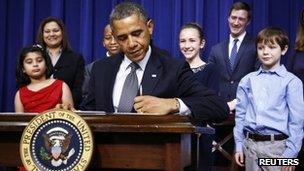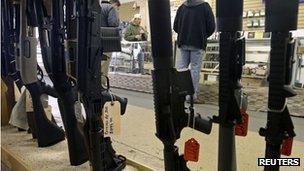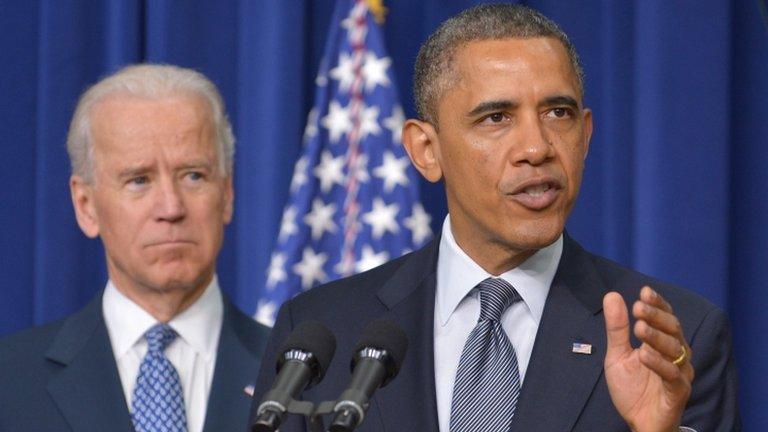President Obama's next campaign - against the gun lobby
- Published
- comments

President Obama marshaled the rhetorical power of child letter-writers in the statement
President Barack Obama called on Americans, from parents and teachers, to hunters and sportsmen, to say "enough".
He talked of a little girl, Grace, gunned down at Newtown, who loved the colour pink and the beach. A picture she drew now hangs in his private study.
The audience included parents of the children murdered at Sandy Hook Elementary School. Alongside him were children who had written to their president urging him to do something about the shootings.
If it seemed like a campaign speech, it was.
Campaign techniques
Conviction politicians campaign to win elections as a means to an end. That end is bringing about change. This time, Mr Obama isn't making the mistake of allowing the massive organisational operation that allowed him to win an election to go to sleep when the real job begins.
It is not just about TV props such as being surrounded by kids. It is about motivating grass-roots groups, bringing campaigners together, using the infrastructure of the election campaign to co-ordinate and organise.
The reason the president needs to use all the techniques of a campaign to get public opinion on his side is that powerful forces, representing many Americans, fear such changes are a danger to their country's basic values.
The battle over guns is part of a bigger war. But it is one that will last for years and could partly define the mid-term elections in 2014 and possibly the 2016 presidential race as well.
Many Americans may not be aware of it, but the scale of gun violence is one of the things that defines their country's image abroad.
Many in Britain and elsewhere in Europe simply don't understand America's reluctance to impose more restrictions on firearms.
They regard the argument that more guns mean more safety as the politics of the madhouse.
But it is not just the view from abroad. There is a gulf of incomprehension between the two sides in America too.
'The essential freedom'
The president wants to ban what he calls "weapons of war" and magazines that can hold many bullets.

Guns sales have reportedly spiked since the Newtown shooting
He wants to make everyone buying a gun go through a background check. At the moment an estimated 40% of all gun purchases take place without a background check, because they occur between a buyer and a private seller, rather than a licensed firearms dealer.
He wants to lift a ban into government research into gun violence.
These moves may seem small-bore compared to gun laws in many other countries, but they are a very big deal here, and it is hard to see how the ban on assault rifles will get past Republican (and indeed some Democratic) opposition in Congress.
Gun owners I speak to aren't putting it on. They feel genuinely bewildered and believe that their rights as honest and law-abiding citizens will be restricted if the president gets his way.
America's relationship with guns is complex and divided. The opposition to new rules is not just the pragmatic objection of hunters and sport-shooters. For some, it is based on the fundamental belief that gun ownership is the essential freedom upon which all other freedoms rest.
President Obama knows this will be a long, hard battle, part of his determination aggressively to take on American conservatives and brand them as wild-eye opponents of common sense, acting against the interests of their country.
- Published16 January 2013
